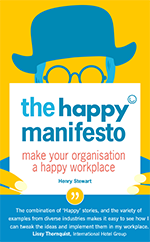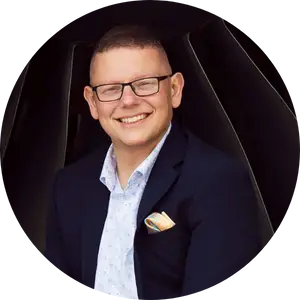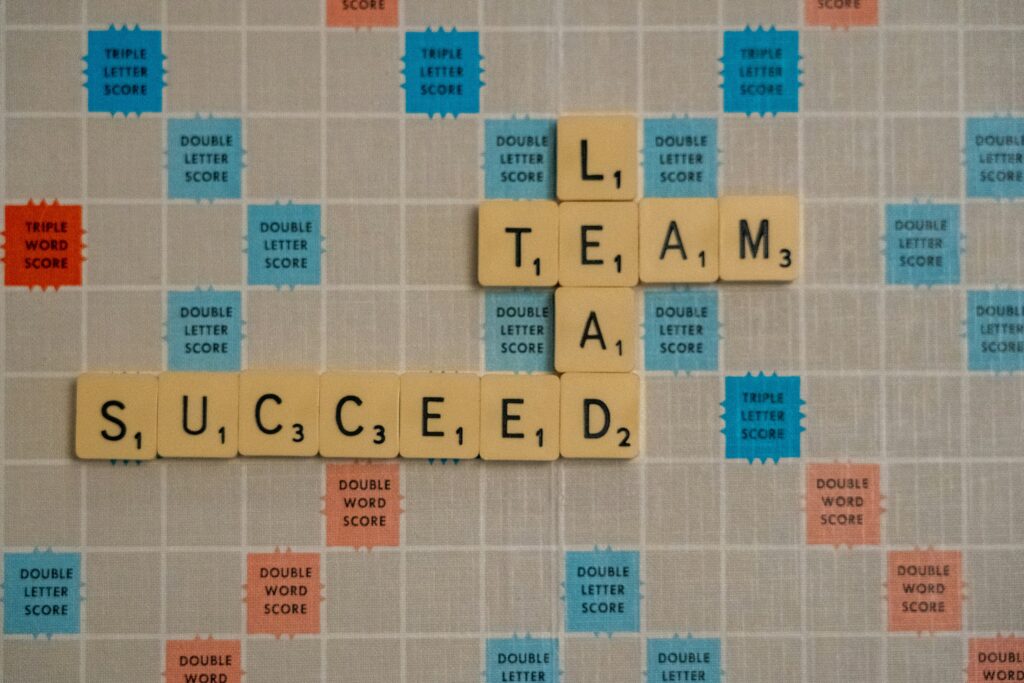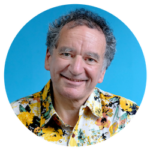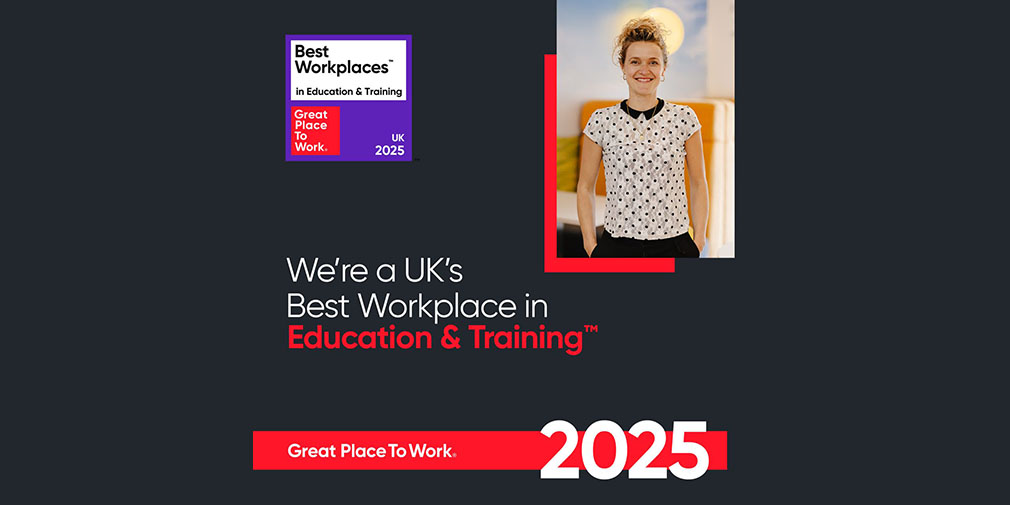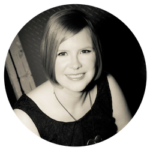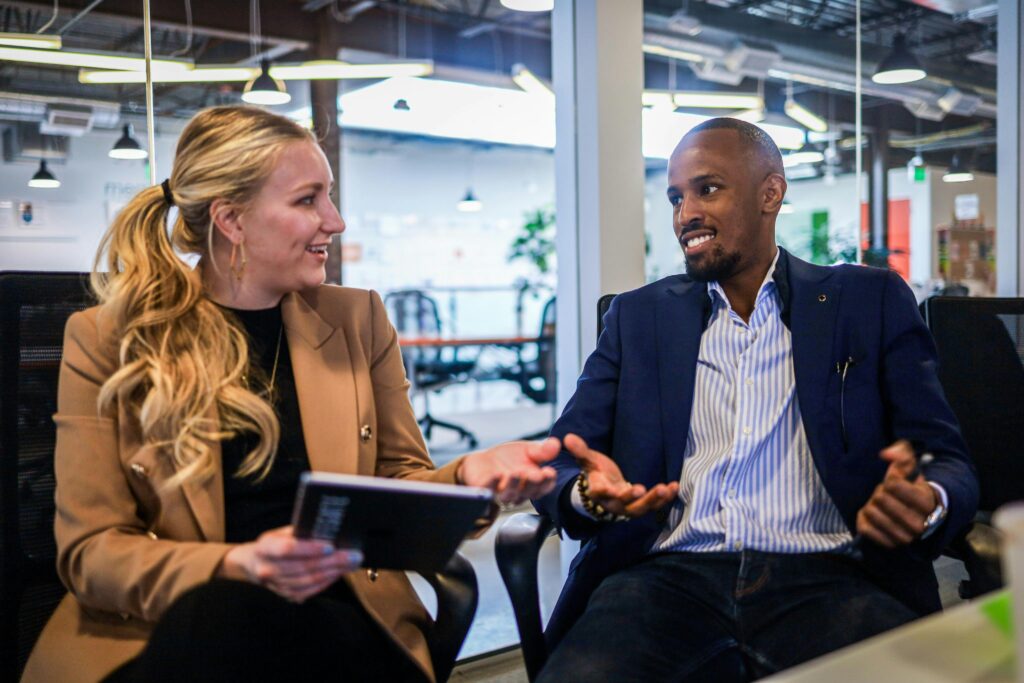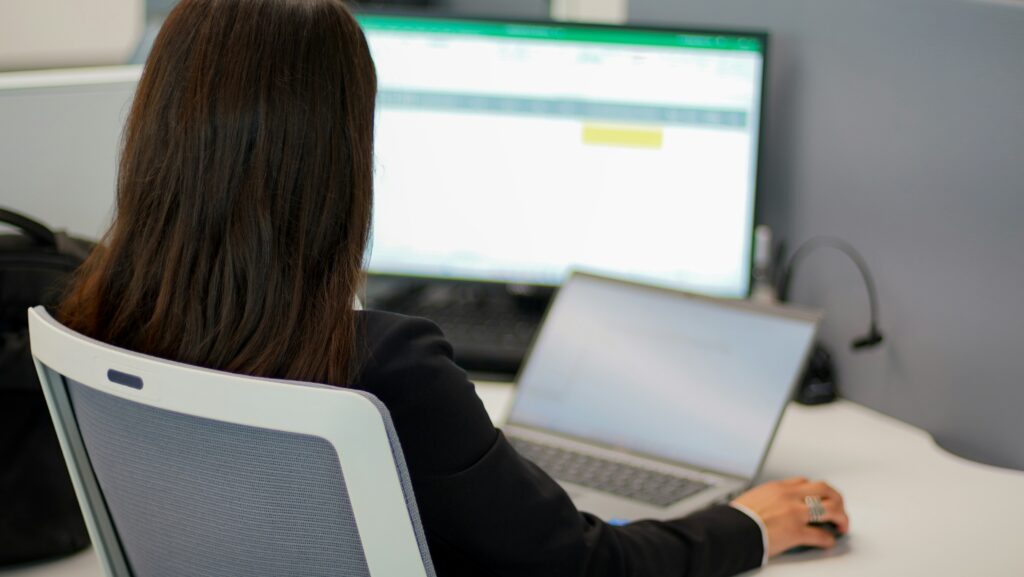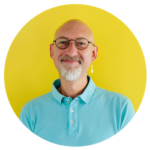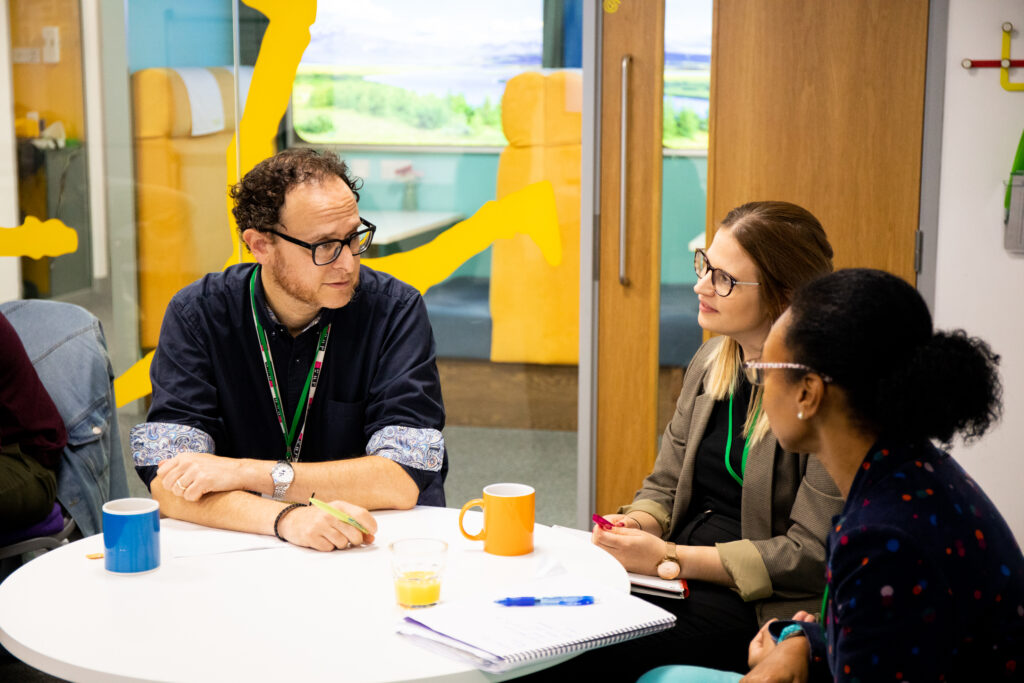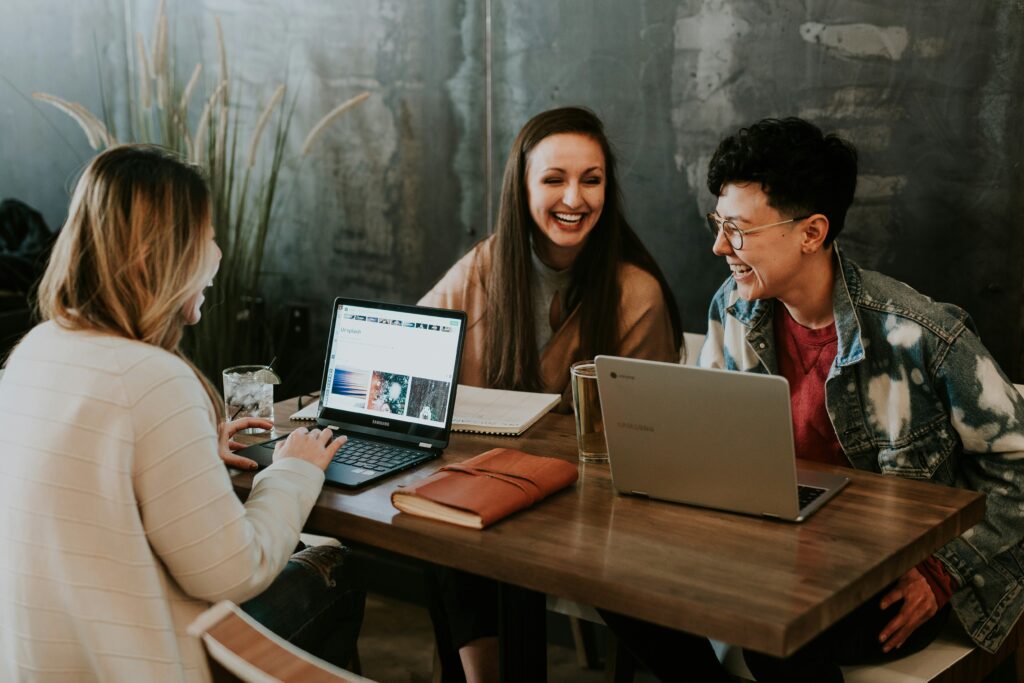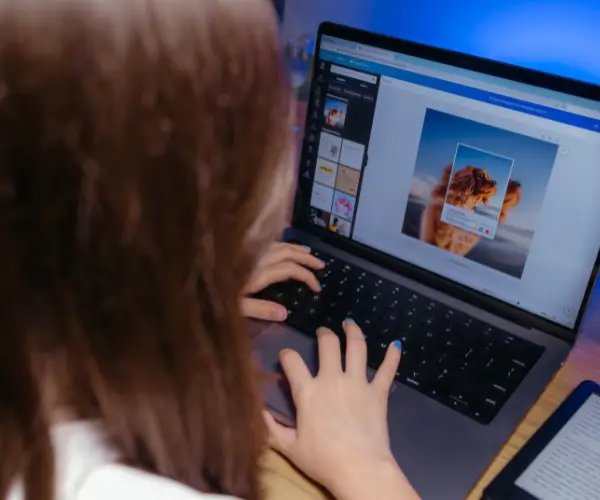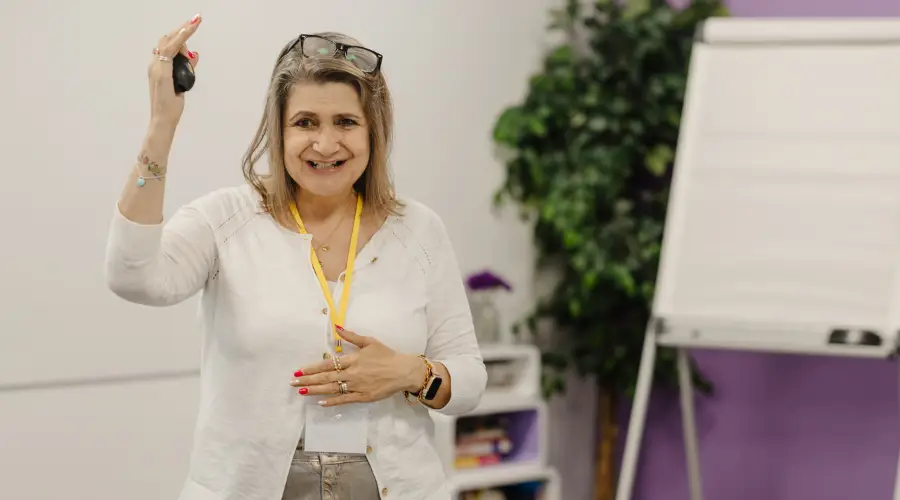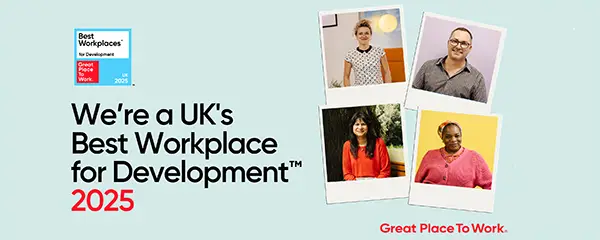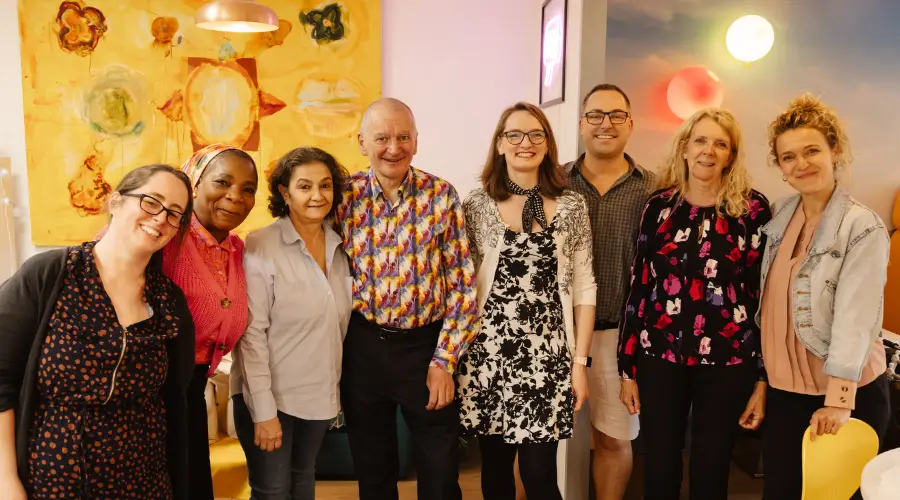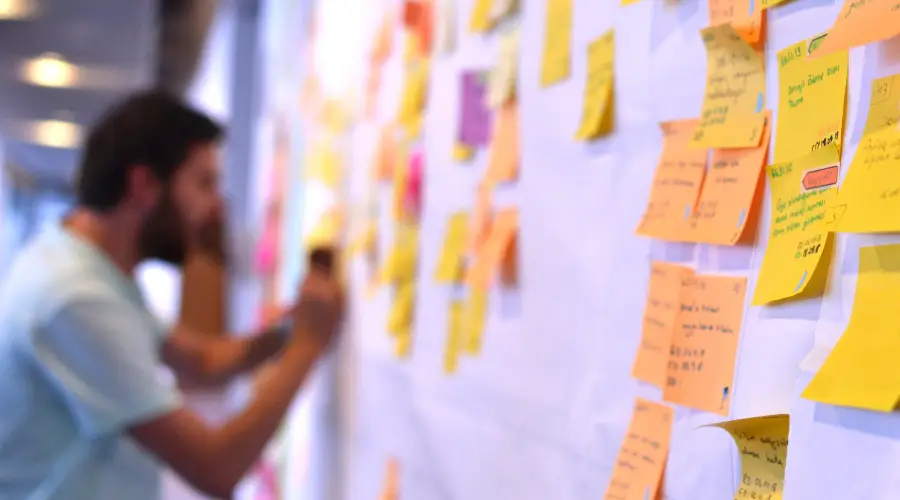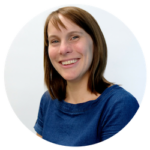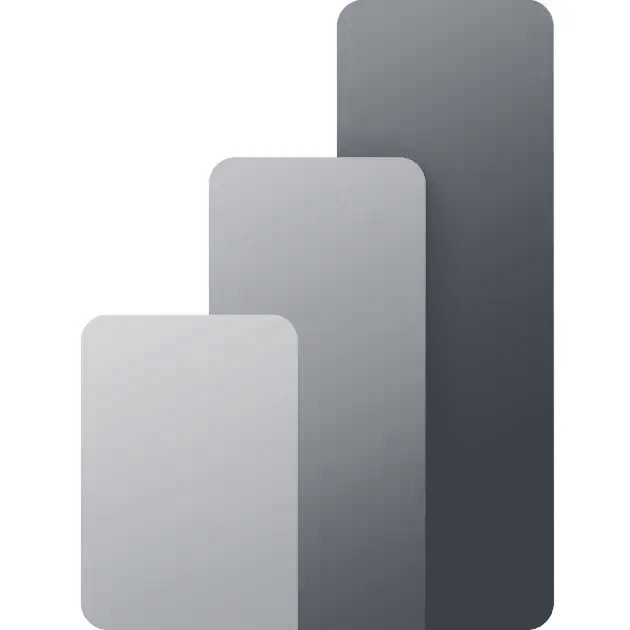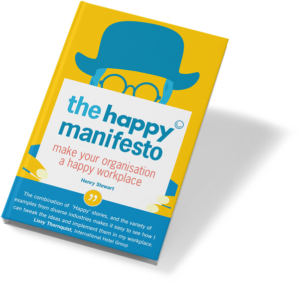Maureen: Thank you, Cemal, for joining us. Cemal has a company called Change Please which helps homeless people become baristas and it provides them with a home. Richard Branson named it his ‘start-up of the year’ and it was rated the ‘Best Social Enterprise in the World’ in 2018. He was also rated, get this, the 46th coolest person in the world. Wow! So the pandemic was really tough, as you know, for everybody; and for Change Please that meant reducing their staff from 72 to 12, but the good news is now back up to 370. So please give a clap and a wave to welcome Cemal! Thank you for joining us.
Cemal: Thank you for having me. I’m so happy to be here. I’m going to share my story: Happy was, well I say Happy though really I mean Henry, was a key part of my motivation to become a social entrepreneur, which I’ll explain a little bit about.
I just realised I had a picture of a turtle floating behind me so I’ve just changed that to a plain white background.
[screen goes blank as Cemal takes a moment to start up a presentation]
I want to speak generally about disruption, and why disruption for us is so vitally important
To start with, my personal background is that my parents are refugees; they came over in 1976 from Cyprus and they sacrificed everything for me and my sister to go to a good school. And then in my mid to late 20s I was a commodity broker. I had a bit of a, I was just about to say midlife crisis but then I realised if that’s midlife at the age of 29 then I’m going to be dying about 60, let’s say a third-of-my-life crisis: at the age of 29 I was on a trip to Vietnam. It was an 18 hour bus journey going up from Ho Chi Minh City to the centre of Vietnam. There was this American traveller that sat next to me on the bus, at 2 o’clock in the morning, and he said “Look, if you’re not happy with your job, or your life, you should do the ‘rocking chair test’”. He explained that it was to imagine sitting in your rocking chair at the age of 90 looking back on your life thinking: ‘What have you achieved?’ ‘What’s your legacy in the world?’ ‘Have you left the world in a better place?’ ‘How are your children going to remember you?’ And generally asking ‘what’s this whole life thing been about?’
I just remember feeling empty, soulless. I had been trying to get to sleep and I went from being exhausted to feeling bolt awake; just thinking about who I was as an individual. I remember thinking that if that bus crash were to crash there and then who would actually care? Hopefully some people in my family, my friends, my bank manager, my insurance broker but that was about it. This’ whole life thing’ would have been over and it really made me question who I was as an individual: what’s this whole life thing been about? What’s my motives for being alive really, and it was a huge issue And then a couple of weeks later I went to this silent tea house in a place called Hoi An in Vietnam, it was this really stunning tea house that was set up by these ladies who some were deaf and some were mute and they came together and created this beautiful space. The only rule in the space was that you had to be silent and you had to order your tea etc through sign language. So that was when I had the idea to set up Change Please; it was the 23rd of April 2014.
I came back to London and I went on a course called ‘The School of Social Entrepreneurs’ where I met Henry, which was a huge motivating force for me: his energy, his way of seeing things differently. I came from a corporate world so the philosophy of Happy and the way that you can have a really happy workplace generally contrasted to the one that I was accustomed to, working a commodity firm which was completely different and definitely not happy! It really inspired me to go down this route of social enterprise and I set up Change Please which essentially tackles homelessness through coffee.
Here’s a quick video which shows you a little bit more about us:
Female voice: “There are many problems in the world that feel almost impossible to solve. But homelessness is not one of them. Even though it is an issue faced by all major cities in the world, Change Please offers a solution different to that offered by governments. By delivering an employment first model we are a life-changing organisation where 100% of Change Please profits from selling our coffee support people experiencing homelessness. With a living wage job in the coffee industry, housing in just 10 days, training, mental health therapy, and a fresh shot at life. And we’ve proven this works with an 82% success rate.
We launched with a single cart in Covent Garden London and we have grown across the UK and internationally, into a total of 8 countries. We now supply coffee to banks, law firms, hospitals, gyms, supermarkets, universities, train networks, airlines and will soon be in space. Always serving our 5 time ‘Great Taste Award’ winning coffees. This is not just coffee, this is life-changing coffee.
Change Please employees:
“They’ve done more for me in a year and a half than the whole government has done for me in 12 and a half years.”
“They’re a stepping stone out of darkness. For me, really, it’s like a star. It’s like a star to me so hopefully I can cling onto it.”
Female voice: “And news of our work has spread around the world. We were named the World’s Best Social Enterprise in 2018 and won many other awards. We’ve also just launched our own bakery school; supporting people who are homeless with new skills. We find, support and train people experiencing homelessness who have amazing abilities, all they need is the opportunity and support to become great employees.”
Change Please employee:
“I’ve never known a company that will bend over to see that their employees have everything that they need and that they’re happy.”
Cemal Ezel: “Social Enterprise is a win-win solution. If you’re going to buy a product anyway then why not do good at the same time? By choosing social enterprises consumers and corporations are voting with their money to make the world a better place.”
Female Voice: “Homelessness is a problem that we can all solve. This is a movement, a model that goes beyond coffee and homelessness. This is the future.”
Will.I.Am: “It takes us all to figure out how we can apply ourselves to solve the world’s problems.”
Female Voice: “Our model works, but we can’t do this alone. We need your help to keep more people off the street. We are changing the world by doing business better and it proves that if you want to change the world you just have to change where you buy your coffee.”
[Video ends, Cemal resumes speaking.]
And all of that in 5 years I think really stems from The School of Social Entrepreneurs and what we learnt in those moments, and from those meetings with Henry which is really exciting.
I think my first nickable idea was just feeling comfortable to make mistakes. During the journey, right at the beginning I wanted to just make everything perfect and I didn’t want to start until we knew everything. And I then realised that I actually didn’t know anything at all. Our model initially just started with providing jobs but then we realised we had to provide housing, and then we realised that the most important part of what we should be offering was therapy support. No matter how quickly you give someone a job and a house if you’re not tackling the root cause of that pain and that trauma, of why they became homeless in the first place, whether it’s being a victim of domestic abuse, of sexual abuse, going through a divorce, a bereavement, being an ex-offender or ex-military, then you’re not tackling the problem. And I never knew any of those points. Now we encourage all of our staff to feel comfortable if they make a mistake but also to seek out criticism. For example, rather than just asking the customer ‘Was everything ok?’ we now ask them ‘What one thing would you change about your experience?’ and really seek out negativity, seek out problems.
That stands true to our model as well: we purchase coffee from sustainable farms. The coffee is then roasted by people who are homeless. Our coffee is now carbon neutral, we have plastic free packaging, our cups are made with aqueous lining that can go into bins and all of this is from our staff asking those difficult questions and trying to seek out criticism from our customers as well.
It’s worked in a lot of corporate locations (some technical issues occur).
We supply coffee to a whole range of organisations and what’s really amazing is their desire to want to make a difference as well. And their openness to be willing to learn about social business and to make a difference in their workplace as well. Last night I did a talk for CBRE and one of the biggest challenges was ‘how do we start on a social enterprise journey?’ and one thing that we tell everybody is it has to be a journey; you have to take the plunge from somewhere and I think that’s part of the entrepreneurial mindset which we really promote at Change Please.
For me this slide really represents the power of social business and getting our clients to think differently. This is Delta Airlines, they have got 800 planes around the world and use a huge coffee company. We met them and said rather than talking to you about our coffee we’ll show you what we do. We took them on a walk around Atlanta to show them the real problem about homelessness and what we explain to them was that by moving their coffee to Change Please it would reduce the cost of their coffee by 11%, yes Conde Nast said the coffee we placed on Virgin Atlantic was the best coffee they had had on any airline, but also we could reduce homelessness by 75% for women and children over 5 years. This is in a state where it’s the second worst state for children to be at risk of homelessness. And that walk around Atlanta to see the problem, to see the challenges we really took them on a journey with us. The head of procurement said it’s the most disruptive, innovative way they’ve ever seen a tender. So for us disruption, the way we do things differently at Change Please, is really at the heart of what we do.
Most governments around the world tackle the problem of homelessness by building housing but they’re not building housing quickly enough. This building really only tackles the problem of homelessness temporarily because you’re not developing society, connectedness and a community feel; it’s just temporary and that person’s always relying on somebody else. Whereas we tackle the problem through jobs, as I said before, everything that we’ve done today has all been about disruption and you’ll see that in the second part of what I speak about
What I’d like everybody to do now for this first breakout session is just think about that rocking chair test. Can you think about you at the age of 90? To think about ‘what’s this whole life thing been about?’ I often think to myself, personally, that my social construct and my values as an individual have been based around when and where I grew up: I was born in the 80s, and with my parents being refugees, my values system was all about making money and success. If I was born 1000 years before, if I was born in the Amazon rainforest in a tribe, for example, how would my values system be different? We’re still all humans but what we are born into affects the way that we see the world, and I really believe that some time to just stop and think about ‘what’s this life thing all about’ is important. You can’t get too deep in 5 minutes, so just on a basic level think about our rocking chair test. We asked all of the staff who joined as Change Please to do the same thing, not the full 370 people yet but the initial 72 people at least have done that, and one of the key reasons that we asked people to do that is this: the journey that we bring people on with us isn’t easy. There’s a lot of disruption, we do things differently and there’s going to be a lot of hard moments along the way so you need to really understand what your motive is as you’re going along your own personal journey. It really helps you to develop roots that keep you strong during those difficult moments and that’s why we feel it is so important for all of our staff to do that when they first join.
Thank you to the people who wrote lovely messages in the chat, it’s so kind of you. You made my heart warm.
At the beginning of Covid all of our sites closed, we had just taken on a new cohort of trainees, of beneficiaries and we had a responsibility, a duty of care, to support even though we weren’t able to make any money as the sites were all closed. It really broke our business model but we just thought we should do the right thing: so we had some coffee vans that were randomly quite close to some of the Nightingale hospitals, so we took our vans and we set up outside all of the Nightingale hospitals across the UK: London, Manchester, Cardiff. And we provided free coffee to doctors and nurses 24-hours a day. It was that wonderful time in our history when everyone really cared about and clapped for the NHS and we set up so they could come out and have some free coffee. The NHS was really grateful and Natalie, who at the time was the COO, she came and she said ‘look this is absolutely amazing, it’s really wonderful of you; and this might not be relevant but there’s actually a coffee tender going on at the moment. You might have no chance at winning it as there are hundreds and hundreds of companies that are going for tender too but just apply and see what happens. It will be an experience and maybe then in 8, 9, 10 years time when you’re a bit bigger you can apply again and might have a better chance.’
So we applied and we won. Which was pretty insane. That was a 4 million pound contract for 2 years so £8 million in total.
The message we took from that was ‘Choose Love’. We think of that before every decision that we can; if we find ourselves at a crossroads, we don’t know which way to go, we just choose the love direction and decide to do the right thing even if it’s not commercially viable or it’s not pragmatic from a business perspective. We just choose the right direction, and I know it sounds obvious but it was a really powerful story for a lot of our team to take away; and they apply that now in their personal life and work life, and it really is one of our big nickable things that should be obvious but sadly isn’t when you work in business.
Going back to the theme of disruption: one of the big challenges with our business model and also with homelessness generally is trying to get vital services to rough sleepers. There are services available in big cities around the world but they’re so disparate and we decided we wanted to do something about it. So, during the worst time that you could try to buy buses which was during covid when Transport for London were buying every bus that could be seen, we decided to buy 3 buses of our own and to transform them so they could provide vital services to rough sleepers. The buses provided everything from showers to haircuts, clothes washing, new clothes… on one of the buses you could open a bank account, on all the buses you had access directly to a doctor for a virtual consultation. Just a couple of weeks ago we had a lady who had a lump in her breast and she had done nothing about it and we got her emergency access to a doctor. On another bus we’ve got a state-of-the-art dental surgery; 40% of people who are homeless complain about pain in their mouth and 15% of rough sleepers have tried to pull out their own teeth because of the sheer pain. And we put all of these services on these buses and we have them in London, we are opening one in Manchester, and it’s never been done before anywhere in the world. When we were receiving all of this press coverage about what we were doing the main theme in the coverage, the keyword was that we were being disruptive, thinking outside the box, trying to break the status quo of how the services have been provided and it really represented the values of the people that work for us and how we try to tackle the problems differently.
And something perhaps a little bit confidential, although I’m sharing it with a 108 people is that in the middle of next year we will be launching a cruise ship as well which is going to be providing everything from housing to mental health support, rehab; on the Thames in partnership with two councils that are going to be providing, once again, vital services to rough sleepers, which in this case will also include temporary to permanent accommodation. Again, this has never been done anywhere else in the world and as we’ve been working with a couple of mayors on the project it’s led to discussion with the mayor of LA as well which we’re now having discussions with. So really taking disruptive ideas and trying to think outside the box and do things differently is something that we really take to heart here at Change Please. This picture is my son, he’s called Sonny and he’s my inspiration. He had a very difficult birth, he shouldn’t be able to walk, shouldn’t be able to eat and do things independently and yet he’s literally a walking miracle (as said by a neurologist and a range of doctors). And I sometimes take that for granted: he jumps in my car and hits every button you can imagine, flicks loads of switches and I get frustrated with him but I then sit in the seat and think ‘I never knew the car could do this, this is phenomenal!’ He then jumps on my laptop or my iPad and hits every single button and I’m just like: ‘wow these are new functions I never knew existed on my laptop!’. But I still get frustrated with him at the time and it’s really just taught me so much about patience and about being comfortable with allowing things to get broken and to just see what happens off the back of that. Letting patience be part of that journey for me, personally, and that is something that we are sharing with all of our staff, going back to that point I made earlier where we asked people what one thing would they like to change about what we offer. Sonny is just a great representation of that and so I wanted to share that story.
Then, another story: This is about someone that we supported who is also an amazing person. His name is Adan. Adan used to be an executive chef in New York, he studied at the Kemps College which is basically the Harvard of culinary education in the US, it’s the best place you could study to be a chef. He moved to the UK with his family in 2007/ 2008 and unfortunately in 2009 he lost his wife and daughter in an accident. He then lost his job, lost his home, lost everything that he came to the UK for, and he ended up homeless around Borough Market. It was a really sad story, he was depressed, he was suicidal. And then at the end of 2010, in November, he was walking past Blackfriars Bridge. It was a freezing cold night, icy cold water in the Thames, there’s about 3 to 4 mm of ice in the Thames and as he was walking past the entrance to Blackfriars Bridge he heard a scream from behind him, and he looked around and he saw a lady jumping into the Thames, her name was Amy, she’s jumping into this icy water trying to take her own life. Adhan, who had lost everything, he ran to where she had just jumped off, where everyone else was just looking over, calling 999, not knowing what to do, he took off his clothes, he jumped in after her and ended up saving her life. And it made every newspaper, both national and international, as you can imagine at the time, in 2010 he became a minor celebrity. He ended up winning the George Cross for bravery from the Queen, which is the highest civilian award that anybody can win. He also won a high commendation from Prince Charles at Buckingham Palace and that high commendation had not been given to anybody for 43 years until him. In 2012 he was literally a national hero and from 2012 to 2014, 15, 16, 17 he said to me that as soon as that press died down and he went back to the streets people forgot about him, and they put the same labels on him as they put on anyone else who was homeless and on the streets: as being a drug addict, having mental health issues, alcohol dependency and the truth of it is that he’s literally a national hero. That should be the label that we put on him. But people forgot that and we put him in a box. I must have walked past him many times, we’ve got sites around Borough Market, and it’s easy to put labels on people, to put people into boxes and have unconscious bias and stereotypes. Then he joined us and we literally couldn’t find anybody else as good as him to train people because his taste for sweetness, bitterness, acidity in coffee was amazing and is vital to be a brilliant barista and then he went on to train our other homeless staff as well.
And here’s just a quick video from BBC Comic Relief which tells a quick story about Adan.
[Video starts, it’s Adan being interviewed by Michelin Starred Chef Theo Randall]
Theo: “So Adan, tell Me about your past, I hear you’ve had quite a rough time of it.”
Adan: “Yeah, so where we are right now this was my bedroom, this is where I used to sleep.”
Theo: “Just here? You slept here?”
Adan: “Right here. Yes. A good 10 years I slept here. This was my safe haven.”
Theo: “Why here?”
Adan: “Because of the heater, yeah, especially in the winter. I came to London and somehow I ended up here, right on this very spot. I’ve had people try to urinate on me, set fire to me, throw bottles at me but I think the worst thing you know it’s just the loneliness. The starvation, the hunger. Constant, constant hunger.”
Change Please Spokesperson: “We firmly believe that everyone should be allowed another go and actually sometimes you get into a position, we’ve all been in places where actually you’re a bit stuck. Things that seem simple to a lot of people, just like talking to someone across a coffee counter, can be a challenge.”
Theo:”How has Change Please changed you?”
Adan: “Well I’m still rebuilding my life but without Change Please, without their kind of support, they did more for me in a year and a half than the whole government has done in 12 1/2 years. They took me off the streets, they got me into a place, they gave me clean clothes, they gave me dignity and I’m looking forward to getting back to being a chef because that’s my trade. Never be able to do that if I didn’t have the support from Change Please.”
Theo: “Maybe you should come and work for me.”
Adan: “I would love to, maybe one day Can you afford me though?”
Both laugh.
[Video ends, Cemal starts talking]
And that was Theo Randall who is a Michelin star chef, and he could afford him, which was wonderful.
[Photo of Adan in chef whites prepping food in a kitchen.]
This brings me onto my next nickable idea: Based on that story about Adan, labels preconceptions, unconscious bias… we did an internal review on our unconscious bias at Change Please and what we do; and even a company that’s attracting amazing, socially minded and curious people we found that we still had a lot of unconscious bias in our teams and we started to question those. One of the things that we did was that we sent a range of CVs out, in all 8 countries, to our managers with a job description, the job role and we asked which of these CVs do you think would be most suited to each job role? And what are the reasons why? What was so interesting was the local unconscious bias and stereotyping that came along with that and why they were choosing certain individuals, and why they weren’t. It was something as simple in some cases as cultural bias, gender bias to physical expectations of an ability to do a job. And that’s something that really made us question ourselves, as an organisation and as individuals, we found it on an international basis and we found it regionally, in the UK, which was really interesting.
I then questioned my own bias and found that I have an issue with authority bias or as a company we have an issue with authority bias. When I make a statement, and it’s actually quite difficult being a founder CEO and an entrepreneur where you feel like you have to leave everything (and Henry is going to kick me for what I’m about to say), when you feel that you have to lead from the front and come up with all the ideas and you have got responsibility and shoulder all that burden, but you try to dictate the route that the company goes in- and I know that’s completely the wrong thing and it’s not the Happy way- but it’s just my natural inclination, and I notice that people are listening to what I was saying because I was saying it and that really is a bad case of authority bias. Then I really started to do things like be the last person to speak, to ask questions rather than give advice and I really questioned a lot of the biases that came naturally in our organisation.
Here’s my breakout question, and I know this might be quite difficult for 5 minutes, and I know I shouldn’t have two questions but my first question is can you think of any biases, preconceptions or labels are there in society, in work or outside of work which you may have noticed but overlooked? It’s difficult I find when we have some social norms or values that we’ve been told are acceptable in some instances, we’ve seen it recently and the police in Charing Cross, that we overlook them and we say that they are acceptable but that perhaps we haven’t questioned or maybe we wanted to question and those we wanted to change. Perhaps that’s a bit of a deep question for 5 minutes but it can be a starting point.
Or, going back to Sonny, is there anything that you want to break in your workplace and rebuild? That’s probably easier to answer in 5 minutes.
Henry: What kind of team structure do you have under you? That’s the first question.
Cemal: So we’ve got a Managing Director in each country, they then report to me and another CEO. Then what we try to do is, I know it sounds a bit of a cliche but, we have as flat a structure as possible where there are people who are on the same wage as each other, or there’s no more than two-and-a-half times difference between the highest wage and the lowest wage. Then we’ve got the head of retail teams and head of impact teams. I’ve tried to keep the impact and the commercial side seperate, so you get a clear focus on each of those areas; when we’re competing against Costa, Starbucks and all of the big coffee chains around the world you need to have that commercial competitiveness at the forefront of your mindset. When you start to mix in a bit of the impact into it I found that it tends to water down a little bit of your edge. So what our commercial teams do is generate income and generate the surplus and that surplus is given to the impact teams to manage and then reinvest into impact.
Henry: Amazing. Next question: how do you continue to innovate and get these amazing new ideas?
Cemal: At 3 oclock in the morning and don’t fight the idea and try to get back to sleep! That’s how it happens to me personally, I tend to have these brain waves in the morning. Also what we try to do at the end of pretty much every meeting that we have is to encourage our teams to come up with not just general ideas for the company, but asking that question at the end of each meeting – how can we do this differently? It’s about welcoming that disruption, welcoming that challenge. I really find that it is difficult sometimes for people to feel uncomfortable saying ‘I feel we should go in this direction’, so we tend to actively welcome it. Also asking our teams: what one thing could you change? I think that’s really vitally important because you’re openly asking for criticism and opening ourselves up for change.
Henry. Excellent! And the next question is what is your top tip for helping people to unlearn hierarchy? It sounds like something that you had to learn, so what was your top tip for doing that?
Cemal: It wasn’t difficult for me to unlearn hierarchies because it was quite a painful, traumatic experience that we were all involved in, we had just the one charge which was making money at all costs. That, for me, was the first thing I wanted to do at Change Please was make it, I know this is a Happy conference, but really make it a happy place to work. I get more enjoyment seeing the people in our teams grow and develop and be happy then I do in seeing that the company is growing and I feel the same seeing it in our trainees and beneficiaries. To me it’s inviting people from as many different parts of the organisation to feel welcome to share their opinions and their views; but also on our board we’ve got people who were formally our trainees and now they are mentors and they help by sharing their lived experience of how Change Please operates, and how we can improve.
Henry: Brilliant, brilliant! And what is your ambition for how far you can go with Change Please?
Cemal: That is the hardest question. Because I never expected us to get to where we did in 5 years and the opportunities that come to mind… I’m just super excited about what’s possible. Some of the things happening are just crazy: I mean, we’re going to end homelessness in Skid Row, in Los Angeles.
Henry: Wow.
Cemal: We are currently one of the fastest-growing coffee companies in the world. These crazy ideas start off crazy, like the buses, like the cruise ships, and we put them out on the table and our team finds a way to deliver them. I think my goal is to keep putting those crazy ideas on the table for our teams and just say ‘how do we do this?’, for me it’s not a case of whether we do this or not, it’s just ‘how do we do this?’. And we just find the time, spend the time brainstorming, breaking down the status quo and finding the solutions to the problems. That’s the most exciting part for me, we don’t have problems we have solutions; that would be another £5 in the swear jar for me. We have solutions to our challenges and that to me is so exciting: we have people that are so motivated to find the solution to things that we just feel like anything is possible. That’s so exciting to me.
Henry: And do you have a swear jar if people say problems, is that real?
Cemal: Yeah, yeah it’s £5. It used to be £1, then became £2 & then went up to £5. [laughs]
Henry: And how often do people put money in?
Cemal: Now it’s become a virtual swear jar; there’s a link to a virtual swear jar so we just send the link to somebody and they just send over the £5. There’s so much we are doing through Teams now, so we just send the link out and they put the money in from their debit card so, yeah, very often Henry. I’ve even got my parents doing it!
Henry: Have you really?! [laughs]
How do you avoid burnout? How do you prioritise and keep the main thing the main thing?
Cemal: So for me it is such a difficult issue. Sonny has been a bit of a circuit breaker for me, especially with what he went through during his birth, and I’ve been reading so much around the importance of parenthood, of fatherhood, and being around as your child is growing; it has really forced me to take time off and to be mindful during the time I’m spending with him. That really is one of the only ways that I’ve been able to switch off. I’m one of those people that’s kind of all or nothing and when I switch off I just completely switch off- which actually never really happens- but when I’m all in I’m all in. Sonny really allows me, indeed he forces me to do it. At the talk I was at the other night I was talking to a really wonderful lady called Cecilia, from an organisation called Babies from Love- you might know her, I’m not sure. She told me that her way of switching off these days has been to do a circuit breaker for 6 weeks: she goes cold turkey as the CEO, as the founder of the company and just sees how the business survives without her and that’s really interesting. I don’t know how I could do that.
Henry: Could you do that?
Cemal: It’s probably the same feeling as when I say to some of the beneficiaries that we have who are on heroin: ‘You need to come off it we’re going to support you on methadone’, it’s probably the same fear that they have, that I have at the thought [laughs]. I don’t think I could do it for 6 weeks but I am going to try and do it for 2 and build my way up to 6 weeks. You know what though? I still have huge levels of motivation; it’s a problem I have as a founder where I carry with me large amounts of everyone else’s problems- it goes back to the authority bias that I mentioned previously- it’s something I’m really working on, I’m trying to hand over more.
By the way, what I’m saying is, just because this is the way we are doing things as an organisation and we’ve been successful doesn’t mean it has to be the way that you do things. What you teach at Happy is absolutely the right thing and I think that perhaps I’ve switched off from doing the right thing as a shortcut, a way of moving quickly. What I need to do, my next step is being a better leader and to restructure the organisation.
Sometimes it’s easy to look at organisation and think ‘well they have grown quickly, they have done well’ and therefore one should try to replicate what their leaders have done, but this is a perfect example of why you should not do that because I really think there’s a danger of compromising doing the right thing in order to grow quickly. That’s what I’ve done as a leader and that’s the next stage of my journey: to really Improve myself as a leader.
The last thing on that point: there is a huge amount of support for entrepreneurs when they’re starting out, but that entrepreneur, that founder then gets propelled to the position of CEO; and then in the public world, I know Happy is slightly different, but in the public world there isn’t that much support available for that journey from entrepreneur to CEO. I feel there’s a big knowledge gap there and that’s something I’ve had to learn the hard way and I’ve still got a long way to go.
Henry: You need to come on our level 7 senior leader course.
Cemal: Ok I’m in! [Both laugh]
That’s been my biggest challenge and is the next journey I have to take. That could be the thing that’s going to limit our growth I think.
Henry: Ok, I could talk to you endlessly but I think we need to wrap it up there. It’s been an amazing story. Could everybody unmute their microphones and give a big round of applause for that. That was amazing.
[Applause]
Thank you so much for sharing. Thank you so much, that was brilliant.
Cemal: Thank you everyone. I’m going to leave, but have a lovely day, enjoy the conference.
Henry: Bye-Bye.
